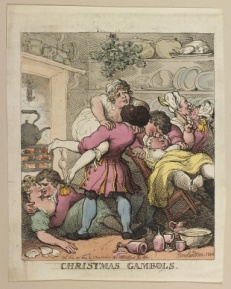The poet Robert Southey, in the guise of a Spaniard travelling to England, remarked upon the great number of large sugared plum cakes to be had at Christmas in London. However, he concluded sourly that not much else was celebrated during the holiday.
“This is the only way in which these festivals are celebrated, and if the children had not an interest in keeping them up, even this would be disused.”
— Letters from England by don Manual Alvarez Espriella, Volume 3, By Robert Southey 1803
The great festival of Christmas had been on the wane in Protestant England for some time, in danger of falling by the wayside like many other religious festivals of the old faith. Still, plenty of merriment went on during the holiday.
Take the battlefield, where a plan to march soldiers to another location to prevent excessive drinking was scarcely successful, for it was only a:
“.. change of scene and not of situation, for they got so drunk Christmas night that the grenadiers set fire to one of their tents…”–Royal Military Panorama, Or, Officers’ Companion, Volume 3, 1813
A: “I had reason to know Mr. Barker paid particular attention to Mrs. Loveden, and she always made a Point of Dressing more upon those Occasions when he visited at the House.”Q: “By Attentions, do you mean improper Attentions, that you thought their Attentions to each other were of an Improper nature?A:”Yes.”–Journals of the House of Lords, Volume 48
Southey could not know that Christmas would soon regain new prominence in the Victorian era when it would take on a many-mantled cloak of new traditions. In the meantime, he and other Regency romantics had to remain content with what Christmas offered then: a moment of reflection, by which the entirety of the year could still be measured:
“From you the play’rs enjoy it and feel it here,the Merry Christmas and the Happy Year,There is a good old saying–pray attend it:As you begin the year, surely you’ll end it.”–from the Prologue of Cymon, A Dramatic Romance by David GarrickThe London Theatre: A Collection of the Most Celebrated Dramatic (Vol III) by Thomas Dibdin (1815)


